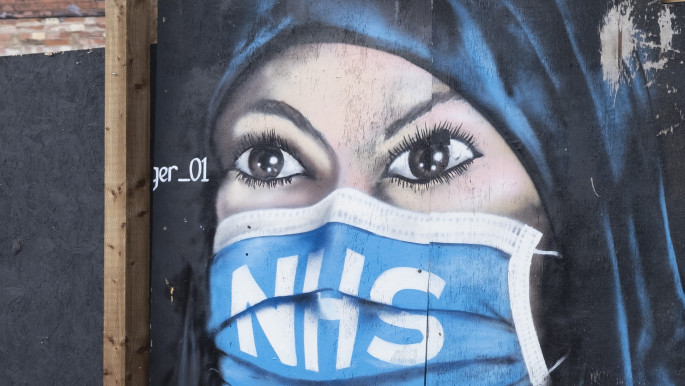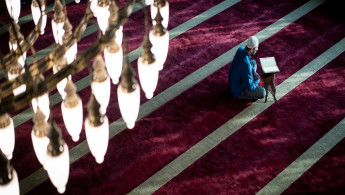Lockdowns, quarantines, restrictions: British Muslims forge digital pathways to family during a lonely, Covid Ramadan
Muslims across the UK are observing the month of Ramadan in the absence of familial traditions due to Covid-19 restrictions, but they're using technology to bridge the gap.
5 min read
The reality of mixing with family in the UK remains grim [Getty]
For many Muslims during the month of Ramadan, the setting of the sun is synonymous with the warmth of a kitchen filled with various scents of traditional home-cooked dishes from across the world in preparation for iftar. It is associated with a bowl of dates placed in the middle of a table and glasses filled with water as everyone gets ready to break their fast together with family and friends.
But for many, such scenes of Ramadan belong in a nostalgic past, or as it has colloquially become known, 'pre-Covid'.
The global coronavirus pandemic shot across the world like a flurry of bullets and accompanying the virus are damning statistics: 4.39 million cases globally, 127,000 deaths and counting. Lockdowns. Quarantines. Countless restrictions. This has become the new reality.
Earlier this month British Prime Minister Boris Johnson announced the easing of lockdown measures in the country for the first time this year, meaning that family members who do not live together can now meet up outside in groups of six.
But the reality of mixing with family in the UK remains grim, while international travel restrictions remain in place for those Muslims who take this time to see family abroad, and thus such restrictions chafe.
 |
|
| Read also: Muslim leaders and NHS urge British Muslims to continue vaccinations over the month of Ramadan |
"Many of us are mourning parents, grandparents, cousins and friends – and too often we were not able to attend their funerals, or grieve as a whole community."
Before Covid, iftar was a family affair
For many Muslims around the country, this year's Ramadan has been a very different experience.
"Before Covid, iftar was a family affair," says 32-year-old business strategist and copywriter Nadia Amer, who moved to London from Dubai two years ago with her husband.
"Gatherings are usually a big part of Ramadan, and we had actually originally planned to fly to Dubai for Ramadan because the days are shorter, the sunset is earlier, and the holy month vibe is popping. In London, Ramadan passes without you really feeling the spirit of it," she adds.
"It's still a little strange opening the window at sunset and not hearing the Maghrib azaan (call to prayer) floating in the air from a nearby mosque. In Sutton, sunset features Metropolitan police car sirens and ambient traffic noise."
For 27-year-old Ahmedi Imam Sabah Ahmedi, iftar hasn't changed – but congregational prayers have.
"Before Covid I would go to my local mosque, Baitul Futuh in South West, but due to Covid the number of people that can go to pray are limited so now I offer the Taraweeh (night) prayer at home."
 |
Sadly, this Ramadan, many families will have empty seats around the iftar table |  |
Ramadan generally is known to be a time for community. Prior to the pandemic, centres, mosques, and universities organised iftar dinners, and invited the local community to join in and eat together.
But that too came to an end as Covid lockdown restrictions came into effect, and with that real life gatherings were replaced by digital communication.
 |
| Prior to lockdown last year, this was a common scene for iftar and community prayers [Getty] |
"My mum and sister live in the UAE, so I sometimes prop my phone up against a jar of biscuits and call them so they can see my son eating his dinner as he eats earlier than us," Nadia reveals. WhatsApp and BOTIM are the two apps she and her husband use to communicate with family abroad.
"My husband's grandmother lives in Syria, while my dad is stuck in Lebanon and can't get back to the UK because of the expensive quarantine requirements to travel back here. My dad owns a chocolate factory in the mountains of Lebanon, and even though he's fasting, he spends his days churning out hundreds of chocolate biscuits. But it's hard," Nadia adds.
Sabah thus believes technology during this time has been a "blessing".
"I think like everyone, we are using the blessing of video calls and WhatsApp messaging to stay connected with our loved ones during Covid and Ramadan," he says.
"It's really nice to be able to connect with them virtually even if we can't meet in person to open the fast together."
 |
It's really nice to be able to connect with them virtually even if we can't meet in person to open the fast together |  |
 |
|
| Video calls with loved ones has become a reality for many this Ramadan [Getty] |
Isolation during lockdown has given strength to another sinister pandemic: The loneliness pandemic.
Almost one in 14 people aged 16 or over in Great Britain admit to being lonely, up 40 percent since last spring, according to the Office for National Statistics.
"Covid has really isolated us from enjoying the spirit of the month, and it's definitely the loneliest Ramadan we've ever had," Nadia says.
"We're too nervous to go out to eat. Even though restaurants are now open, we're playing it safe and staying in."
This is why Javed Khan is urging the Muslim community to support one another during this time.
"The pandemic had many consequences… but people shouldn't have to suffer in silence; and this holy month we must come together as a community to support one another," he concludes.
Narjas Zatat is a staff writer at The New Arab. Follow her on Twitter: @Narjas_Zatat





 Follow the Middle East's top stories in English at The New Arab on Google News
Follow the Middle East's top stories in English at The New Arab on Google News


